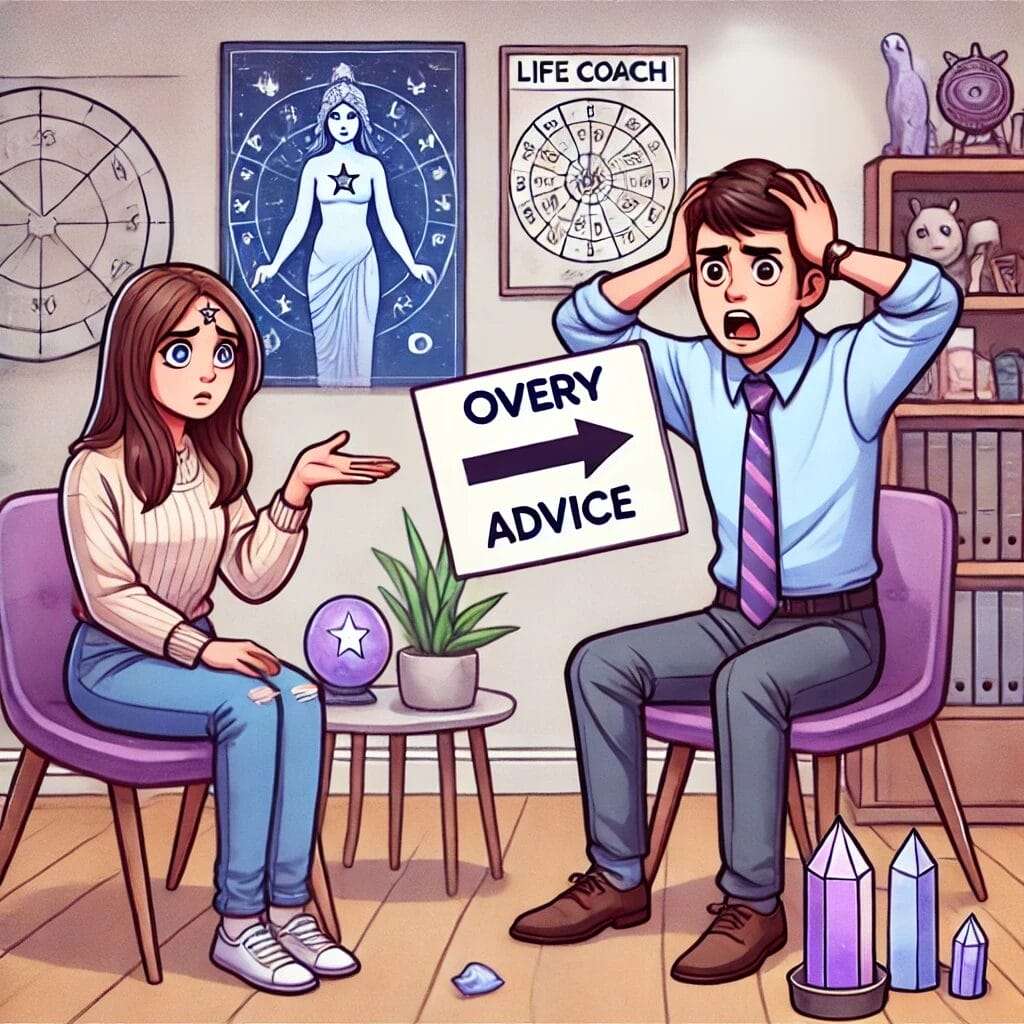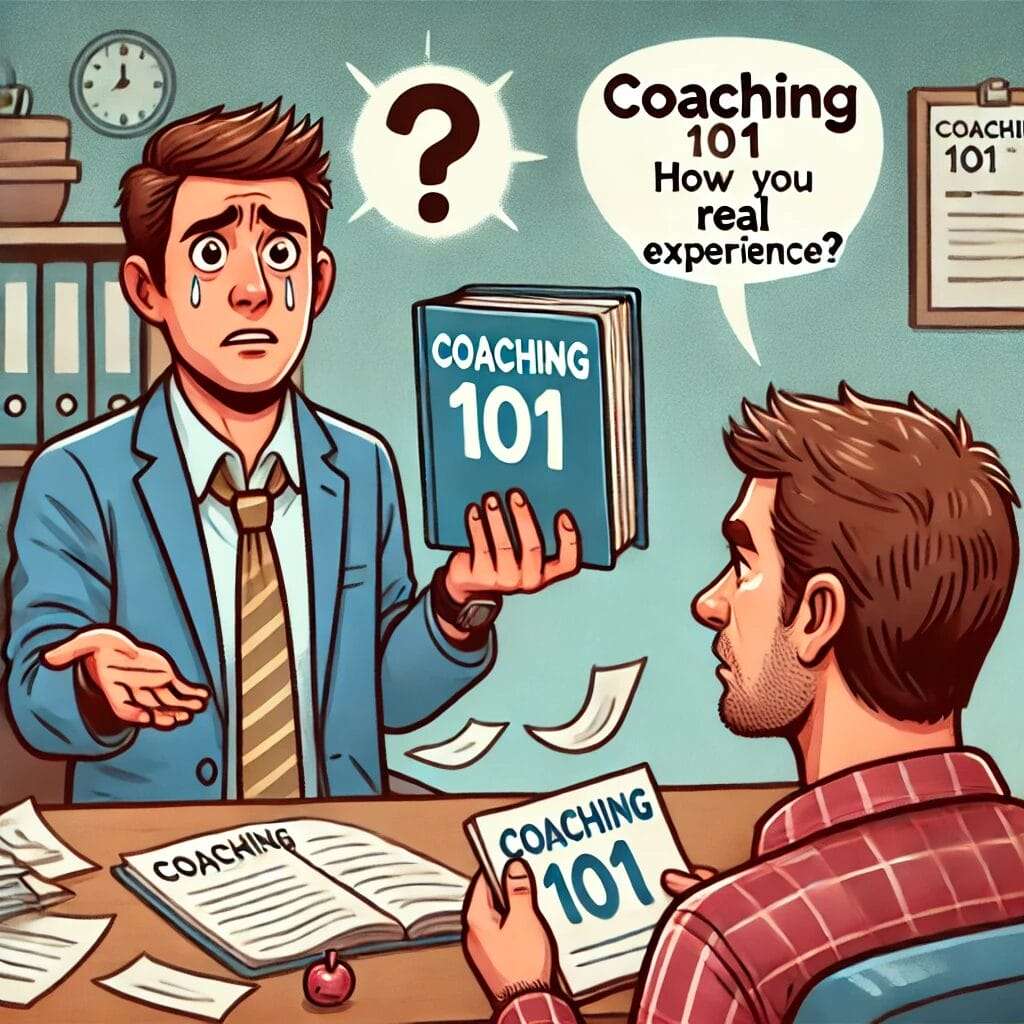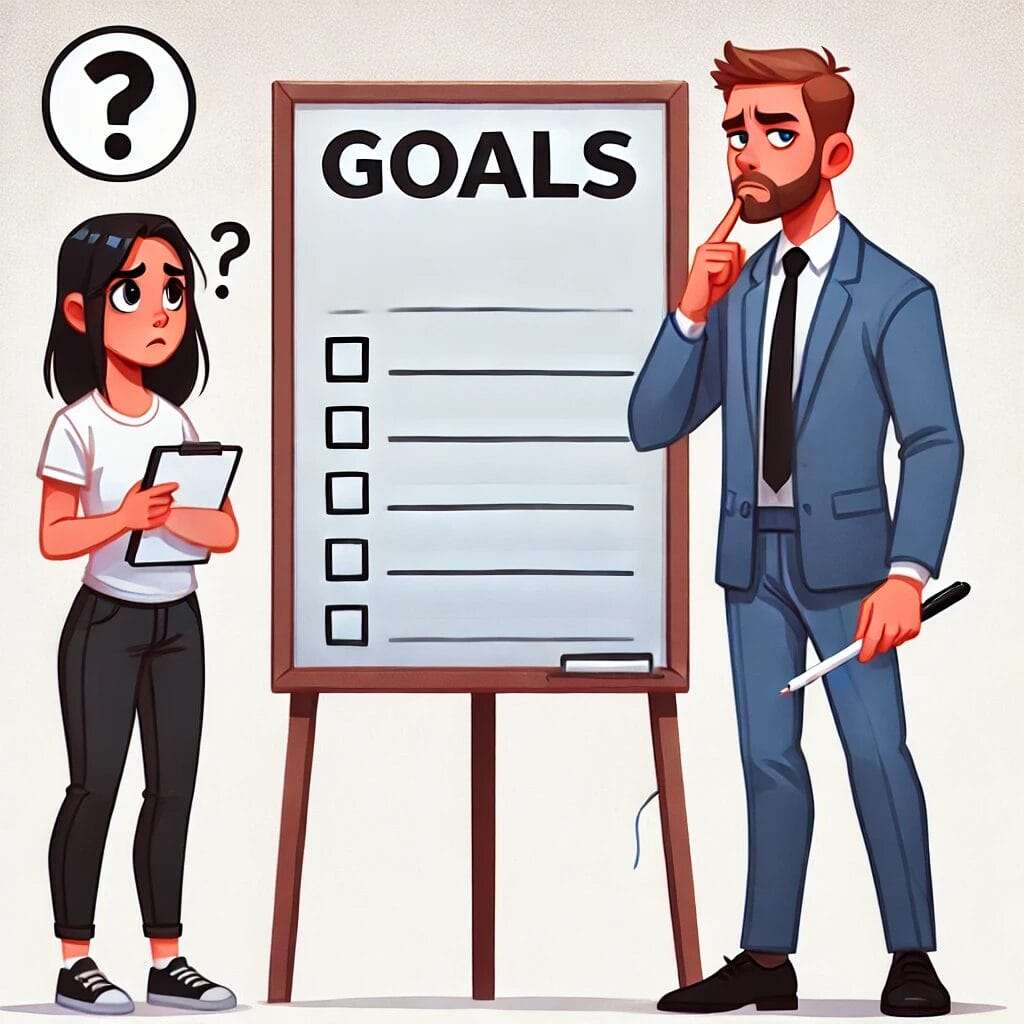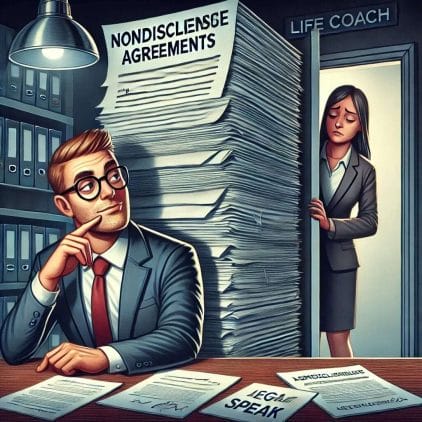
Not Every Life Coach Helps—12 Red Flags You Can’t Ignore
- Updated: April 1, 2025
Let’s get one thing straight: not every life coach is a good coach. Some are wise, grounded, and can genuinely help you move forward. Others? Not so much. In an unregulated industry filled with charm and charisma, it’s easy to get burned.
This article is meant to be a flashlight—shining into the dark corners of the coaching world. Not to scare you off, but to help you stay emotionally safe. Because while a great coach can walk with you through the mess, a bad one will chip away at your confidence and leave you questioning your instincts.
After more than a decade in this space, I’ve seen the good, the unethical, and the dangerously unqualified. I’m not here to throw shade—but if you see even a few of these red flags, it’s time to pause.
Some of the examples ahead are exaggerated for humor—but the warning signs? Very real.
Let’s get into it.

Perfection Is a Myth: Understanding the Coaching Landscape
Before we get into the red flags, let’s clear something up: no coach is perfect. Not me. Not your best friend’s go-to. Not even the ones with fancy book deals and viral reels.
Coaching is personal. One coach might be life-changing for someone else—but completely misaligned for you. And that’s okay.
As a healing and leadership coach, I specialize in trauma and addiction recovery. If you’re looking for nutrition advice or fitness coaching, I’m not your girl. Good coaches know their lane—and they stay in it.
Think of a life coach like a surrogate parent. They’re meant to teach you how to better relate to yourself and others. But if your coach is unhealed, erratic, or caught up in their own ego? That mentorship becomes a liability, not a lifeline.
So now that we’ve got that out of the way—let’s talk red flags. After more than a decade in this industry, I’ve seen a lot. And I’m not holding back.
A life coach is like a personal trainer for your mind, helping you to build mental resilience and clarity. A bad coach, on the other hand, is simply bad and ought to be avoided at all costs.
Denise G. Lee Tweet
12 Signs of a Bad Life Coach

Even though I said that there is no such thing as a perfect coach, myself included, here are some clear signs that you are wasting both your time and money.
As you read through each sign, take a moment to reflect on your own experience. Are any of these issues occurring at least 40% of the time since you started working with your coach? Keep in mind that some examples may be exaggerated for comedic effect, but they serve to illustrate important points.
Bad Life Coach Sign #1: Poor Communication Skills
“I thought you knew what I was talking about!”
A bad coach struggles to effectively communicate instructions, feedback, and expectations to their team or clients. They may be unclear, vague, or fail to actively listen to others’ concerns.
For example, bad Coach Brad may advise you to always stand up for yourself, no matter what. However, the following week, Brad may retract his statement by telling you that you should never say anything that might offend others. This conflicting advice leaves you feeling confused about how to act in future situations. A coach should be consistent and clear in explaining their guidance to clients.
Bad Life Coach Sign #2: An Enabling Coach Won’t Help You Grow

“Well, whatever you think is best, is the best move.”
People-pleasing coaches are so busy trying to keep avoid looking bad, they will agree to anything you say. What is the point of having a coach that cannot motivate or inspire you to improve?
And while I am on this subject, you need to understand that many people in healing and helping careers were attracted to this business due to their own personal struggles. For example, I am a recovering alcoholic and a people-pleaser myself. A competent life coach makes sure their unresolved emotional issues do not bleed onto their clients.
Bad Life Coach Sign #3: Inconsistent or Erratic

“Don’t pay attention to what I said earlier. I was not in a great frame of mind because Mercury was in retrograde.”
Ditzy Danielle is a life coach who you should avoid when it comes to achieving your life goals. She relies on the advice of stars, moon, rocks, or crystals, making her indecisive and inconsistent. Additionally, she is unable to lead by example because she is constantly conflicted due to the new age and pop culture advice she reads on her Instagram feed.
When you are dealing with a life coach who constantly shifts and pivots their advice, run, baby, run.
Bad Life Coach Sign #4: Inadequate Knowledge and Expertise

With an aggressive and intimidating voice: “I know what I’m talking about!”
Due to the unregulated nature of the life coaching industry, there are coaches with varying expertise, training, and experience. Unfortunately, charlatans, sociopaths, and narcissists prey on people who are struggling with insecurities, values, and self-image. This can lead to ineffective guidance and incorrect advice.
Moreover, some coaches may overstep their boundaries by attempting to diagnose or treat mental illnesses, which is not within their professional scope. Life coaching should focus on personal development and goal-setting, not mental health treatment. If a coach claims to have qualifications in therapy or counseling without the appropriate credentials, it’s a significant red flag.
By the way, I have a library of articles, podcast episodes, courses and content available to read on my social media account. Take your time to review a coach’s background and credentials before signing that coaching contract.
Bad Life Coach Sign #5: The Self-Absorbed Coach: More About Them, Less About You

“Don’t you know who I am? I do great things for all of my clients!”
Angry Al is widely known for his decades of coaching experience. He has done it all: TED Talks, Forbes Talks, talks with your mother, and has been a guest on every podcast except for mine, thank you very much. His ego is as big as the state of Idaho, but Al wouldn’t know it because he is too busy promoting himself.
When a coach is more focused on showcasing their own achievements and success rather than genuinely supporting and developing their clients, it is clear that you need to exit this working relationship.
Bad Life Coach Sign #6: Negativity Overload - When Your Coach Kills Your Confidence

“It is pointless here. Just give up now before you lose all of your money and self-esteem.”
Depressed Debbie is exactly the kind of coach you don’t want to work with. Instead of creating a positive and encouraging atmosphere, Debbie uses negativity and harsh words to try to motivate her clients. She might belittle you or make you feel humiliated, thinking that’s the way to push you forward. But that kind of behavior can seriously hurt your self-esteem and take away your motivation.
I’ve encountered a few so-called healers who fit this mold, too. They position themselves as guides, yet their energy feels scattered, revealing that they’re still wrestling with their own unresolved issues. It’s like looking at someone who’s trying to light the way for others but can barely see the path themselves. You want to say, “Honey, you need more time.” It’s jarring to be in that space, especially when you’ve done the work to show up with clarity and purpose.
Sure, sometimes people need a reality check to wake them up, but there’s no need to kick someone while they’re down. A good coach or healer should uplift you and help you believe in yourself, not tear you down.
Bad Life Coach Sign #7: Lack of Adaptability

“I have been using this style since 2005, and it has worked for the majority of my clients.”
Meet Sarah, a coach stuck in the past. She still uses the same coaching manual she relied on when she first got certified way back in 1992. Sarah loves this old method because it helped her, and now she believes it will help you too! Even though decades have gone by, she refuses to update her techniques. No matter how much the world has changed, Sarah clings to her old strategies, even when it’s clear they don’t work for everyone today.
The problem with a coach like Sarah is that she’s not flexible. If you have a unique challenge or need help in a situation that doesn’t fit her old methods, she probably won’t be able to give you the right support.
A good coach should be willing to adapt, learn new techniques, and come up with fresh ideas to help you overcome your specific problems. If they’re not willing to change, it’s hard to trust that they’ll offer the creative solutions you need in your life right now.
Bad Life Coach Sign #8: No Plan, No Progress - Coaches Who Don’t Track Your Growth

“I just go with the flow, and so should you!”
When everything feels mixed up and chaotic, it’s tough to figure out what you really need. Sometimes, if you have a not-so-great coach, they might not set clear goals or keep track of how you’re doing.
Why? Well, they might be dealing with their own problems. I remember one coach who would have calls with clients while taking care of her kids, sometimes even scolding them during the call. It’s pretty hard to focus on improving your business when you’re hearing your coach yell, “Go wipe your face!”
It’s important for both you and your coach to take responsibility for the work you do together and make sure you have a plan that fits your life.
For instance, when I start working with someone new, we start by talking about their life. We look at how they get along with others, handle problems, and more. Then, based on what they tell me, we come up with a plan together that works for them.
Bad Life Coach Sign #9: Poor Time Management
“I need to cancel our session today. Yes, I know our appointment is in less than two hours, and I apologize for having to do this repeatedly, but something important has just come up.”
This might sound familiar if you’ve ever worked with someone like Lazy Larry, a coach with poor time management and a lack of professionalism. Larry has a habit of wasting valuable time in sessions, often veering off-topic to discuss his personal issues—like his marital problems—instead of focusing on helping you. Not only does he arrive unprepared, confusing your concerns with those of other clients, but he frequently cancels appointments at the last minute, leaving you feeling like an afterthought.
Unfortunately, Larry isn’t alone. Poor coaching practices are more common than they should be. One person on Reddit shared their worst experience after spending $6,000 on an “elite” one-on-one coach. See the post below.
Despite the slick marketing and promises of transformative career results, the reality was far different. This coach was frequently unavailable, took ages to respond to emails or texts, and constantly rescheduled meetings because her schedule was “too busy.” The lack of accountability left the client feeling exploited and disillusioned, realizing that, in the unregulated world of life coaching, anyone can charge outrageous fees and make extravagant promises without delivering.
When you invest in coaching, you deserve someone who is truly committed to your growth. Whether it is in person or virtually, a good coach doesn’t just show up; they arrive prepared, focused, and dedicated to helping you achieve your goals. They don’t cancel at the last minute or spend your sessions talking about their personal issues. Instead, they respect your time and your trust, ensuring that every moment is spent on you and your journey.
Instead of addressing conflicts constructively, an insecure coach avoids dealing with issues or resorts to aggressive behavior, which can lead to a toxic coaching environment.
Denise G. Lee Tweet
Bad Life Coach Sign #10: Defensive & Dismissive - Coaches Who Can’t Handle Criticism

“I’ve never had this problem before. Maybe it’s because you don’t understand my coaching methods.”
An insecure coach like this avoids dealing with conflict or criticism in a healthy way. Instead of listening to your concerns or discussing issues openly, they might brush it off or even blame you. This can create a toxic environment where you feel unheard or even attacked.
A good coach should be able to handle disagreements calmly and help you work through any challenges. But when a coach is too self-conscious or insecure, they can’t step back and see the situation clearly. Instead of helping you solve your problems, they might just make things worse by avoiding conflict or getting defensive. This means they aren’t able to support you properly or help you see your own issues from a fresh perspective.
Bad Life Coach Sign #11: Unethical Conduct

Some coaches hide behind their popularity to avoid criticism, using their large following or fame to make you feel like you can’t question them. But being well-known doesn’t always mean they are trustworthy. A bad coach might engage in unethical behavior, like taking advantage of clients for money or breaking your trust by sharing private information.
Unfortunately, these issues happen more often than we’d like to think. It’s not always easy to spot the difference between a good coach who genuinely wants to help you and one who is just in it for personal gain. There are many stories out there, like the one about life coach Brooke Castillo, that highlight questionable coaching practices. This makes it even more important to do your research and make sure the coach you’re working with has strong ethics and is truly committed to your well-being.
Bad Life Coach Sign #12: No Proof, No Progress: When Coaches Can’t Show Results

“[Opinion redacted due to a court order.]” You can’t find out much about Litigious Lisa because she makes everyone sign strict nondisclosure agreements.
A bad coach like Lisa might have a track record of clients who don’t reach their goals or make little progress under her guidance. Instead of owning up to these failures, Lisa hides them by making her clients sign legal agreements that stop them from talking about their experience. This way, she can avoid bad reviews and prevent others from learning the truth about her coaching skills.
A good coach, on the other hand, is proud to share their success stories and can show real results from their work. If a coach is hiding behind lawsuits or threats to stop people from sharing their experiences, it’s a red flag that they might not be delivering on their promises.
In the next and final section, I will share my thoughts about bad coaches.

Final thoughts
Nobody is perfect, but life coaching should be a positive and growth-oriented experience. If you encounter any of these signs in a coach, it is essential to re-evaluate the coaching relationship. You don’t need to work with a coach or anyone for that matter who has poor communication skills, leadership or the ability to help you navigate your current challenges.
Contact me if you need help from an honest and reputable coach. Had a bad or great coaching experience? Send me a message—I’d love to hear from you.
Dig deeper: Do you believe you are in a toxic relationship? Click here to listen to this episode of my podcast or press the ‘play’ button below.





